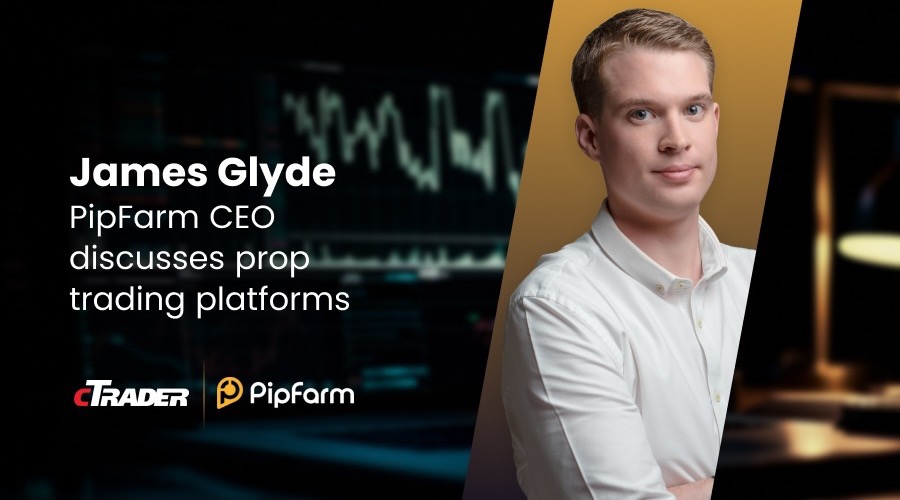While there is no shortage of prop trading platforms available on the market, these options are not all created equal. Finance Magnates spoke with James Glyde, CEO of PipFarm for his perspective and preferences on prop trading platforms. He also touched on the overall prop trading market and the strengths and weaknesses of multiple offerings.
What motivated you to launch PipFarm when there is so much competition in the funded trader sector?
Honestly, it’s exciting. Having worked in regulated business environments my entire career, I saw a great opportunity to use my skills and background to build an exciting product and brand without having both hands tied behind my back. We’re planning a lot of fun stuff product-wise.
It’s true, the level of competition increased significantly recently. We have already noticed the impact: PPC bidding costs have risen, affiliates are becoming more selective and demanding, and competition is pushing prices down and risk up.
However, this level of competition is temporary. Inevitably, many newcomers will fade away when they encounter operational problems, do not gain the expected traction, or do not meet their forecast profit margin. It’s already happening big names too.
How has the prop trading industry responded to the MetaQuotes prohibition?
When MetaQuotes informed brokers to immediately cease grey labelling their MetaTrader platforms to evaluation firms, most reacted by suspending their operations. Some firms haven’t recovered.
Many evaluation firms built a business model that infringed on the terms and conditions of their primary platform provider. Another reason I chose cTrader is that Spotware has tailored its agreements for the funded trader business model. They officially support this business model.
While many traders suffered from firms pausing operations, it provided cTrader a great opportunity to become the preferred trading platform among aspiring prop traders. One thing I’ve observed in all my roles is that cTrader users are more profitable traders.
The prop trading industry triggered a resurgence of white-label trading platforms. Can you explain why you chose cTrader?
The planning of PipFarm began long before the launch. Last year, every funded trader firm offered MT4 or MT5. At the time, only FTMO offered cTrader. There was a clear opportunity for the first one-stage cTrader prop firm evaluation.
cTrader was an easy choice for me. The platform is feature-rich, well-developed, thoroughly tested, incredibly stable and extensively documented. Having spent several years selling and later working with cTrader at various brokers, I know this platform will meet PipFarm’s demands.
You played a key role in the company’s early development and even accepted cTrader’s first Best Trading Platform award at the 2018 Finance Magnates London Summit. What are your thoughts on how the company has matured since leaving?
cTrader was ahead of its time, and brokers were set in their ways. However, as time passed, cTrader’s novel features became more conventional; now, the platform offers the most comprehensive trading experience, with manual, automated, and copy trading all rolled into one. The substantial investment in mobile trading has really paid off, too.
Now, cTrader wins awards yearly, and brokers are expected to offer cTrader. That only happened because of 15 years of consistently developing new features while competitors let their products stagnate.
Most prop firms leading the industry are managed by individuals and teams outside the online trading industry. This year, experienced professionals like yourself are entering the market; why now and what impact will that have on the market?
People and companies who’ve worked in the industry as long as I have are naturally cautious. We’re used to following rules and regulations and considering the potential risk and impact of every decision.
As I mentioned earlier, PipFarm resulted from months of consideration and planning. I’m sure my peers watched the industry grow from the sidelines and consulted with regulatory experts before making their move.
I feel there is a significant opportunity to level up the experience offered to traders. Most firms focus on churning accounts with aggressive promotions and unreasonable rules rather than focusing on what matters.
We surveyed our small but growing community, and when asked which three features they look for in a prop firm, 85% said they look for firms with clear rules, and 75% avoid firms with consistency rules. 60% of respondents said they are happy with cTrader, and 19% said they don’t care about the trading platform and rules are more important than platforms.
While a handful of firms stand out and truly impress me, many more simply practice aggressive and dishonest marketing tactics.
Why do you think this market is rife with inexperience?
We’ve seen this before with forex brokers in 2011, binary options in 2015, ICOs in 2017 and now this. It’s a product where, according to the marketing campaigns, with a small investment, you could make lots more money. In the end, things got so out of hand that regulators had to step in and take away every advantage.
Just as consumers are attracted to the potential to profit, so are operators, who can set up highly profitable businesses with minimal barriers to entry and no oversight or operational expenses related to legal or compliance. Everything can be thrown into the marketing budget.
Funded trader evaluations are a fantastic product that allows everyone to access and try trading with minimal financial liability. I hope more experienced participants will protect this industry and preserve its advantages for users before it’s too late.















